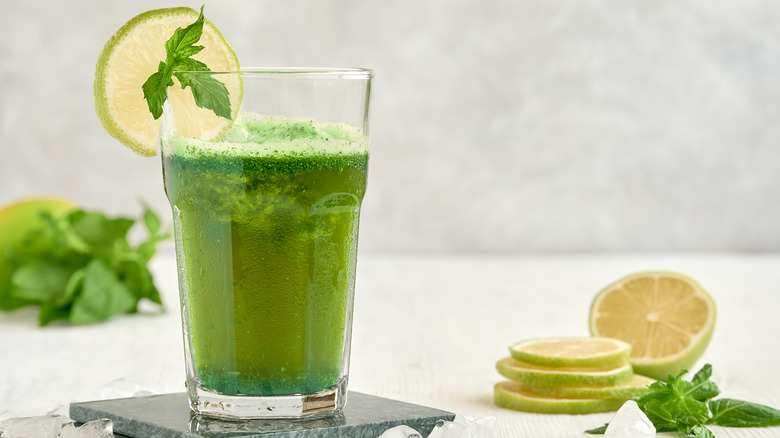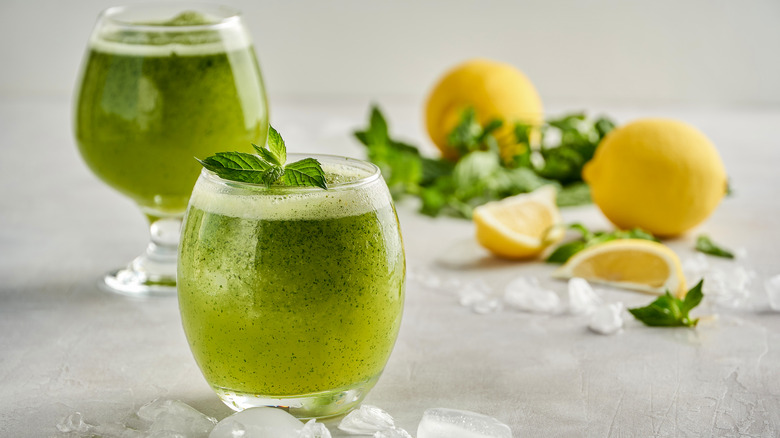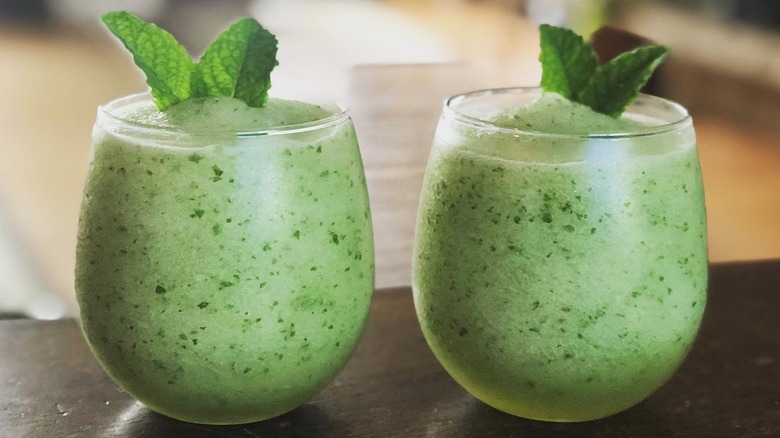Israel's Mint Lemonade Is An Advertising Fantasy Come To Life
Ubiquitous in the Middle East, lemonade with mint can be found throughout the region, especially when the desert heat bears down. In Israel, the refreshing beverage is known as limonana, and frosty green cups of it are sold at falafel stands in the shuk marketplaces of Jerusalem, in the beach cafes of Haifa, and in the bustling shopping malls and restaurants of Tel Aviv.
Drinks made from lemon and mint have been enjoyed for centuries, but it wasn't until the 1990s that limonana really took off in Israel, a craze originally inspired by an unexpected source — bus advertising. At the time, bus ads were a new form of media there. To prove they could be profitable, the Fogel-Levin advertising agency created a campaign of bus ads featuring celebrities promoting a product called Limonana, a convenient bottled form of mint lemonade.
The ads were so persuasive that people started requesting Limonana at restaurants and markets. Demand grew, yet no one could find where to get it. The ad agency eventually revealed that Limonana was just a fantasy — the product didn't exist. The entire thing was made up, from the name to the celebrity endorsements — there was no such thing as Limonana. Any doubts as to the effectiveness of bus ads, however, were settled; the hoax had worked. Soon, restaurants created their own versions to serve, and real products with the once-fake beverage hit the shelves. Today, limonana is so common that some refer to it as the national drink of Israel.
The history of a Middle Eastern thirst quencher
The word limonana is a combination of the Hebrew (and Arabic) words for lemon and mint, transliterated as "limon" and "nana." The Hebrew word for lemonade is "limonada," so by changing the suffix from "nada" to the rhyming "nana," the Fogel-Levin ad agency used a clever play on words to create a catchy product name that has endured to this day — even though when they created it, the product didn't really exist.
Records indicate that a fermented barley drink flavored with mint and citron (a tart citrus fruit that predates lemons) was made in ancient Egypt, and some of the earliest sweetened lemon juice beverages were made in Cairo by 13th-century Jews. Turkey and Syria are both cited as the birthplace of mint lemonade, but the flavor pairing is so prevalent in the region that various countries claim it as their own. Similar debates rage on regarding the origin of another Middle Eastern staple, among other things you didn't know about hummus.
In Israel, the drink is made with few ingredients: a simple blend of lemon juice, sugar, and mint leaves. Egyptian limonana uses unpeeled lemons for a frothy consistency, and sometimes milk for a creamy texture. In Lebanon, lemons macerated in sugar give it a more concentrated flavor. The Syrian version called polo is distinctive due to the addition of orange blossom or rose water. In Jordan, it is called limon bi nana, and in Palestine, it is referred to as nenae ma'a lemon.
Enjoy limonana fizzy, frozen, or spiked
The easiest way to make limonana is to simply steep mint leaves in lemonade and serve over ice. You may prefer to strain the liquid before drinking, but it's typical to drink limonana with all the leafy bits and lemon pulp included. Carbonated water or seltzer can be used for a bubbly drink, or the ingredients can also be frozen or blended with ice for a cold slushy.
For a beverage with so few ingredients, it's best to make limonana from scratch. For the drink's base, using fresh lemons to make lemonade will taste infinitely better than juice from concentrate. Use subtly sweet spearmint rather than strong peppermint, which with its intense menthol flavor will make the drink taste like toothpaste. The mint leaves can be chopped or torn to release more of their cooling flavor into the beverage. You can use granulated sugar, but simple syrup will dissolve better to balance out the tart and sour lemons, and everything can be muddled together by hand, or whizzed in a blender for a smoother mix.
Mint lemonade is also perfect as an alcoholic beverage with the addition of spirits. Spike it with rum and you've got a lemon mojito, or try bourbon for a lemon mint julep. Gin will turn your limonana into a South Side, or add a splash of club soda and it becomes a Tom Collins. Make it with the trendy middle eastern liquor arak for a distinctly anise-flavored, Arabic flair.



